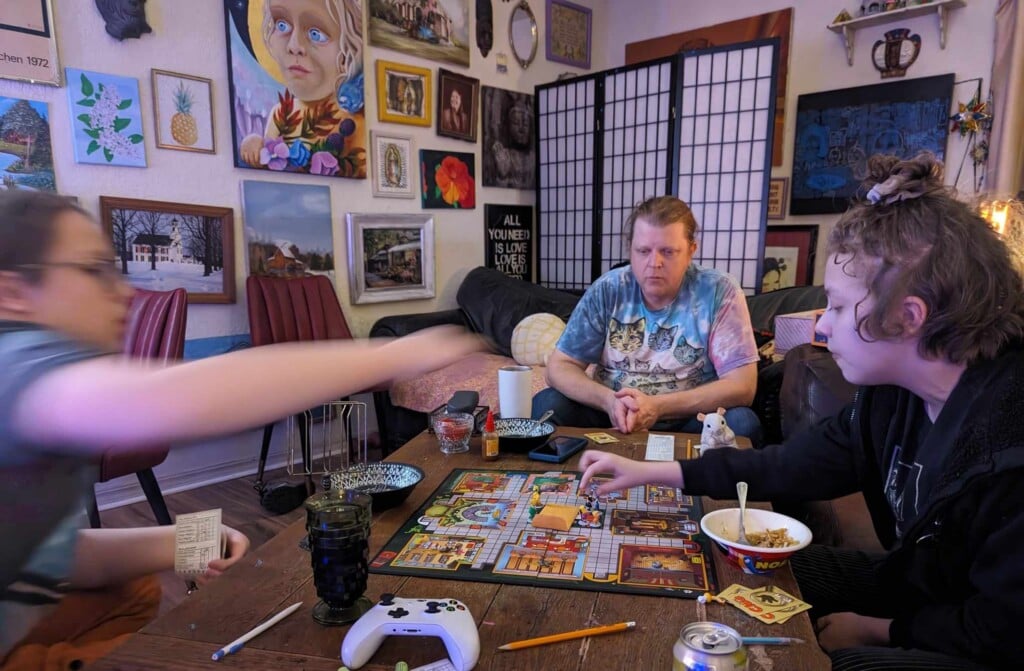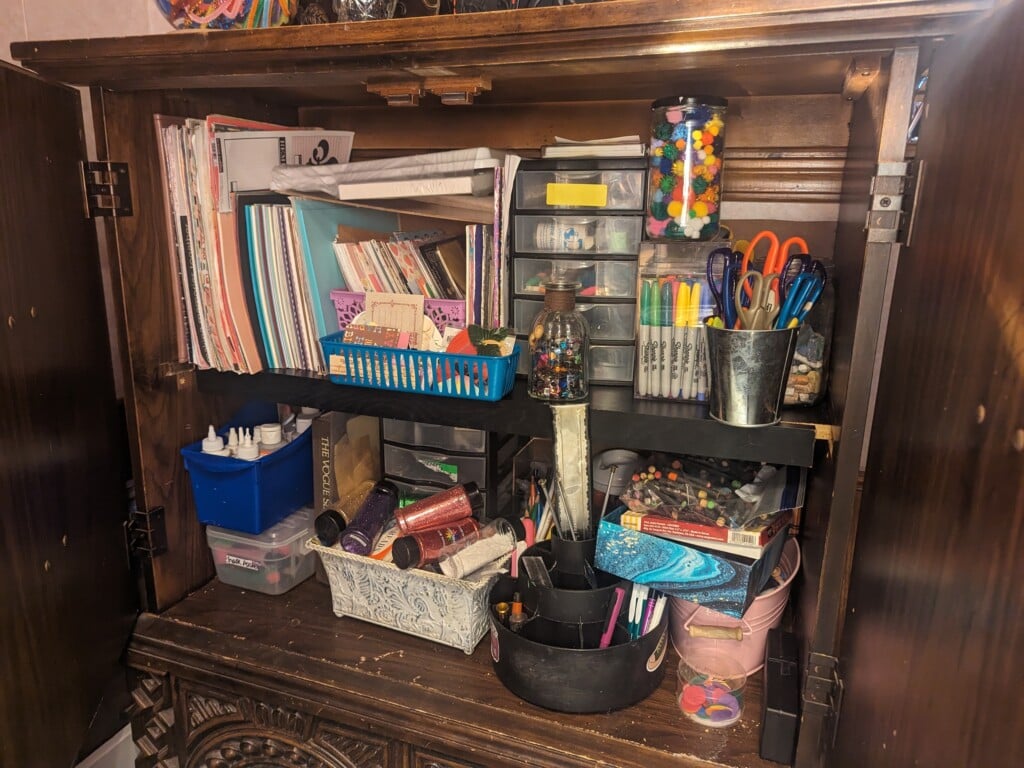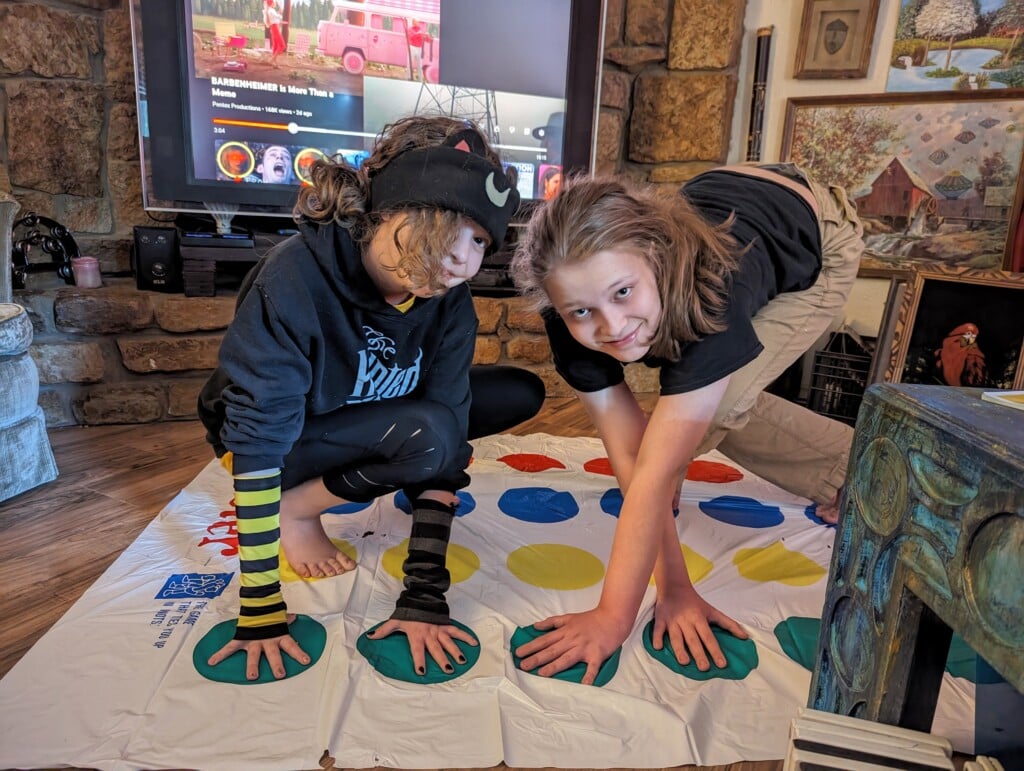What it’s Like Working Remotely

One thing I mention frequently in my posts but I’ve never really written about in-depth is how much I love not only what I do for a living but how I make that living.
I spent years of my life living under the false notion that I was better off working in a traditional job and making a regular income with benefits. But working long days away from my family at a low wage was mentally, physically, and emotionally draining, and unfortunately, far too many traditional jobs these days have a pretty low ceiling on income.
I had spent more than a decade of waiting tables followed by a decade of working in education while trying to foster my writing career on the side, and it was apparent throughout that time that there was very little left creatively after my “bill-paying” job and family obligations. When you’re working constantly at $12 an hour with three kids, it can seem as though you’re treading water and you’re missing your life, your family, and your relationship with your partner.
But it also seemed like the life I wanted to be living was a fantasy. What I wanted was to be able to offer something only I could give but do it on my own time without having to sacrifice time with my family or time for myself. I wanted flexibility and a job that improved my quality of life.
And after getting paid well below my worth while working for a series of supervisors who did things like demanding employees take Myers-Briggs tests and then share their results with coworkers, setting egg timers for breaks and meetings, scheduling constant meetings about nothing, and demanding administrative-level work for a barely livable wage, I was pretty burned out on the culture of most traditional work environments.
Personally, I knew many people who wanted the same things I did, but the economic pressure to keep benefits and a steady (if low) paycheck, the social pressure to be grateful for what I had, and the lack of time left over to actively look at alternatives kept me trapped in my situation.
How I Got Started Working Remotely
While I’d been periodically applying for what I hoped might be better positions that matched my experience and skills, they all seemed to be highly competitive positions with comparably low pay. A great many of the positions I’d seen advertised wanted a four-year degree for starting pay of $10-11 an hour. What I’d always wanted to be doing was pitching and selling writing, something I didn’t feel confident could translate into full-time work in a time frame that would work with my life as it was.
But after surviving a second year of cuts as my job title was slowly phased out and knowing it would be gone in two years, I had a moment of clarity where I realized my job security was an illusion and I didn’t want to start over in another version of the same trap somewhere next year.
That’s when, in a moment of desperation, I joined every Facebook content writers group I could find and started posting. I decided I would write anything, write for cheap if I had to until I learned what people were looking for and what paid.
Although my posts generated responses, the pay they offered was terrible. For a dismal $10 a pop, I could crank out 400 to 500 words of business blog writing. Because I was relatively new to the format, they usually took me about an hour and a half when I first started. But I needed to learn what was marketable and build a portfolio of published pages while I looked for higher-paying gigs, so I took everything I could get.
For the next few months, I crammed even more into my already packed schedule, writing blog entries for clients located in Qatar, India, Canada, and the US. I wrote posts for cheap wedding ring sites, sports blogs, CBD oil sites, and beauty product companies.
I won’t lie; it was a ton of work. But it paid off in a relatively short time frame.
Within a few months, I was declining the $10 per post offers and only accepting higher paying ones. As I connected with other writers who had tips on gigs, which eventually led to me getting a full-time contract offer at a higher rate than I’d previously imagined, and this gave me the time and flexibility I needed to become a full-time remote freelancer at a higher wage than I was making in a traditional job. And on top of that work, I have been able to start actively pitching (and publishing) the kind of creative essay writing I want to be doing at a markedly higher pay grade.
These days, I do contract work for several different organizations, which gives me plenty of leeway to flex my schedule as needed. As a writer, that means I’m offered content writing opportunities every month with my various contracts and I’m able to take on as much or as little as I need to.
At this point, I’ve been a full-time remote worker working a primary contract with side gigs for a few years now, and I never want to go back to a traditional job. Working from home has been a complete game-changer, giving me back a sense of self and a quality of life that was lost when I had to clock into an office or a school. And never was I more grateful to have a remote job than when the pandemic first hit. While the world tumbled about wildly like a spinning jack trying to find equilibrium, my job stayed the same.
While not every job can be done remotely like mine can be, I was surprised to learn how many of my friends and former colleagues shifted to remote work either temporarily or on a permanent hybrid schedule during the pandemic.
And there are plenty of remote jobs out there to be had across a broad spectrum of fields like CSRs, virtual therapists, accountants, and professional consultants. If you have a skill that can be done virtually, getting paid for remote work is a possibility.
Remote work isn’t without its challenges, and it’s certainly not the best fit for everyone. But if you’re thinking about looking for remote opportunities, there really has never been a better time like the present when American workers have more leverage than they’ve had in decades with only about 94 unemployed individuals for every 100 jobs available.
If you’re a parent thinking about looking for remote opportunities, to help you make the most educated decision, here’s my personal take on the biggest pros and cons based on my experience. Since everyone’s experience can vary, this is just to give you an idea of what it’s been like for one person working several contract-type jobs.
Pros of Remote Contract Work
1. Schedule Flexibility
I work to meet deadlines rather than a set schedule, so as long as I’m getting my work in on time, I’m able to shift my schedule as needed. That means I’m able to take days or hours off whenever I want or need to for my family, for health reasons, and basically, for anything I want to.
I know approximately how much time it takes to finish a project, and I will often work in stints where I put on Lofi Girl or some other deep focus music and just crack out as much work as possible. But I also have the flexibility that if anything comes up at all, I can put everything on pause and return to it later.
These are just a few examples of times when that comes in handy:
- One of my kids needs help with math homework.
- I need to spend the day chasing down school enrollment info.
- I’ve got a headache.
- I want to spend the day at a genre convention like Tokyo in Tulsa.
- There’s a new season of Fear the Walking Dead on Hulu.
- I have a short-term opportunity for a lucrative side gig.
And the best part? Why I need time off is my business, and I don’t owe anyone an explanation.
2. High Level of Autonomy
As a remote contract writer, almost all of my interactions are electronic and take place either in simple-to-use productivity apps like Slack or Trello, comments on Google documents, or in emails. In the past, I have had virtual meetings or phone calls on rare occasions where someone needed to communicate a lot of information in a conversation format, but those are highly unusual.
To start work, I typically open a spreadsheet or app and identify projects that need to be completed. Once I’ve finished a piece of writing, I simply confirm it’s in the correct digital location and my job is done.
3. Ability to Work Anywhere
When you work remotely, you can work from literally anywhere as long as it has good, reliable wifi. That means if I want to spend the afternoon with a sick friend in the hospital but I need to get a little work in, it’s not a problem.
If I feel like I need a change of scenery and I want to work at a coffee shop for the afternoon, totally cool. When we recently took a vacation to St. Louis, I was able to take my laptop with me and get a few small projects cracked out in my downtime. And theoretically, if we wanted to travel all over the country for a few months or move outside the country, my work wouldn’t be what was standing in our way.
4. Family Time
One of the hardest parts about working full-time away from home is that I felt like I was missing out on my kids growing up and I very rarely got to spend time with my fella. Conversely, one of the best parts of working remotely is spending more time with the people I love.
Even though I spend a lot of time working just as I would if I left and went in to work, I’m cutting out all of the time I spent in traffic driving to and from work every day and all of the time I spent getting ready for work in the morning. As it turns out, that can add up to a couple of hours every day.
And even when I’m working for a few days straight, I still get to spend time with my family even if it’s just seeing them for a few minutes here or there throughout the day on heavy workdays. If someone is having a bad day, I’m there to comfort them. If I really need a hug, I stop what I’m doing and find one of my kiddos or my partner. And I also get to have lunch with my fella a few times a week, which is something I never would have even dreamed of in my past life.
5. Comfort
Another one of my favorite things about working from home is that I’m always in a pleasant and comfortable environment that I get to curate. Gone are the days of oppressive overhead lights, weird Muzak, and supervisors that chastise me for showing too much cleavage just because I’m big-busted for my height.
Here’s what I love most about my work day environment:
- Cuddling with my cats and dog
- Occasionally sitting near members of my family while we silently work
- Watching Star Trek in the background while I work on an easy project
- Dressing for comfort and pleasure rather than a dress code or what others will think of my attire
- Getting a snack or drink whenever I want to
Challenges of Remote Contract Work
Although remote work is an incredible fit for my personality and professional goals, it’s not without its challenges even for me. For some people, these may be challenging enough that remote work isn’t a great fit for them. Here are some of the main challenges I’ve encountered and how I’ve dealt with them:
1. Family Boundaries
Unfortunately, no matter how progressive a family is, many mothers carry a heavy mental load, taking on by default the primary burden of managing household management and domestic responsibilities. And although my family has actively worked to deconstruct this default-to-Mom burden, it can be quite insidious and at the same time, ubiquitous.
As a mother working from home, I’ve had to work hard to establish personal boundaries, especially regarding the mental load, thanks to the easy access of having Mom around all the time. But on the flip side, I’ve become very good at saying, “Hey, I’m working. Is it urgent?” and encouraging my kids to become more independent.
2. Time Management
Time management is always going to be a challenge for remote workers. Although I’ve been working with deadlines for 25 years and I work well with them, I would be lying if I didn’t say it was barely under the wire sometimes. And when I’m cutting it close on a project, that means I have to work late, sometimes working through dinner and well into the evening hours. While the work always gets done, I have had to work on time management to avoid the high level of internal drama caused by procrastination.
3. Self-Development
When you work for a company that you clock into, you have loads of paid opportunities for professional development and adding professional contacts to your metaphoric Rolodex. As a remote employee, you’re pretty much on your own with any skill development. On the flip side, if you’re motivated, there’s never been more free training available on the web. I’ve learned countless hard skills on my own with the help of YouTubers and digital library resources.
As for soft skills and professional contacts, I’ve met more incredible work connections on Linkedin and Facebook groups than I ever did when I was working in a traditional work setting.
4. Work Boundaries
When you’re a contract worker, it’s easy to get into the habit of saying “yes” too often and then you end up taking on so much work that work-life balance can be affected. For me, it’s easy to get into the line of thinking that if I don’t take on this project, someone else will be in a bind. But I’ve had to learn how to pass on projects and realize that no one expects me to push myself to an unhealthy point, and if they did, that would be on them, not me.
I’ve also had to learn to not pressure myself to get too much done at once, which kind of goes back to time management. It’s easy to get a kind of tunnel vision about powering through and checking items off of your to-do list when you get in the zone. But I’ve come to realize that working like that heightens my anxiety levels, especially since my work takes place entirely in front of a computer.
I’ve learned that taking breaks to engage in gross motor activities can help to reduce stress and bring me back into the present, so I will often take breaks to wash and fold a load of laundry, clean the kitchen, or work on a craft. Sometimes, I’ll even take a thrift store or garage sale break to get myself out of the house for a while.
Looking for Remote Opportunities
If remote work sounds like something you’d want to check out, I recommend looking into opportunities for remote work that matches your skill set and starting from there. You’d be surprised at how many opportunities are available on Facebook, Linkedin, and dedicated contract work sites. Many recruiters also offer a wide range of remote opportunities.
Have you ever dreamed of working from home but you’ve hesitated to make the transition? Do you have any questions for me about what remote work involves or how it affects my family life? Leave me a comment below!
Thanks for reading, and have a balanced week in your little nebula!













